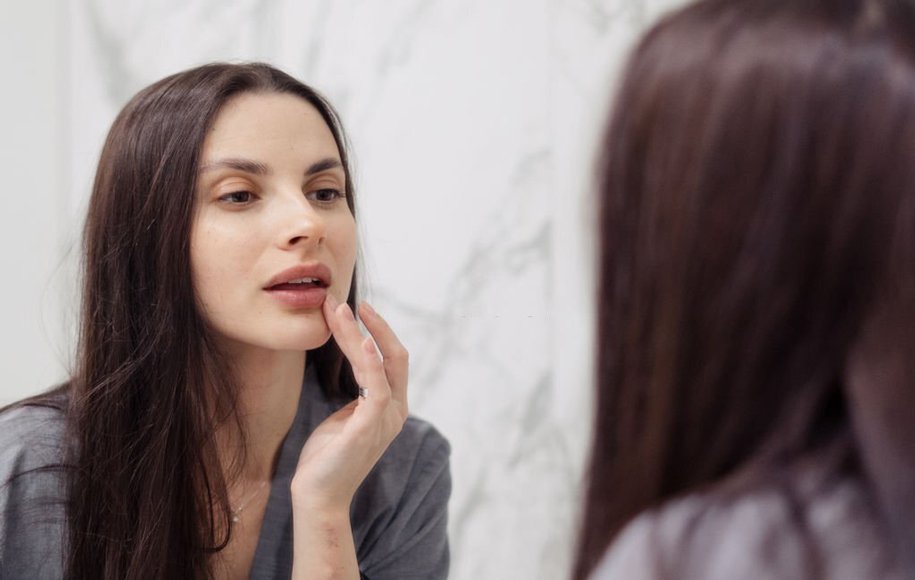Which vitamin deficiency causes dryness and cracking of the lips?
Posted by HOOMAN MORADTALAB

Which vitamin deficiency causes dryness and cracking of the lips?
Cheilitis is a common problem characterized by dryness, redness, and cracking of the lips. Various factors can contribute to lip cracking, including cold weather, exposure to sunlight, and dehydration. However, sometimes lip cracking can be a sign of a more serious issue. For example, it may be caused by nutritional deficiencies. Stay with us until the end of today's article to learn about vitamins and minerals related to dryness and cracking of the lips.
The Nutritional Deficiency and Its Impact on the Beauty and Appearance of Lips
The most common nutritional deficiencies associated with dryness and cracking of the lips are:
1 Iron
Iron is a vital mineral that is a component of hemoglobin (the oxygen-carrying pigment). This nutrient plays a role in many essential functions of the body, including oxygen transport, DNA synthesis, red blood cell production, and cellular and tissue repair. It also helps maintain skin health, promote wound healing, and regulate inflammation.
Iron deficiency leads to iron deficiency anemia and is accompanied by fatigue, shortness of breath, pale skin color, and brittle nails. Additionally, it can cause dryness and cracking of the lips, often affecting the corners of the mouth (angular cheilitis).
2.Zinc
Zinc is an essential mineral that is crucial for maintaining good health. Zinc plays an important role in immune function, digestion, growth, and reproduction, and its deficiency can potentially impact the health of the skin and lips.
Evidence suggests that zinc deficiency can lead to cracking of the lips, as well as dryness, burning, and inflammation at the corners of the mouth. Lip cracking due to zinc deficiency may be accompanied by other symptoms such as diarrhea, weakened immune system, skin inflammation, skin ulcers, and hair loss.
3.B-group vitamins

B-group vitamins are a group of eight water-soluble vitamins, including thiamine (B1), riboflavin (B2), niacin (B3), pantothenic acid (B5), pyridoxine (B6), biotin (B7), folate (B9), and cobalamin (B12). These vitamins play various roles in the body, including energy production, cellular and tissue repair, maintaining skin health, and wound healing.
Deficiency in riboflavin, pyridoxine, folate, and cobalamin is associated with lip cracking. Individuals with disorders that affect nutrient absorption (such as celiac disease, chronic gastric inflammation, and Crohn's disease) are at a higher risk of deficiency in these nutrients. As vitamin B12 is primarily found in animal-based foods, vegetarians and vegans may be susceptible to its deficiency.
In addition to dryness and cracking of the lips, deficiency in B-group vitamins can lead to dermatitis, depression, irritability, and fatigue.
4.Vitamin C
Vitamin C possesses strong anti-inflammatory and antioxidant properties. This vitamin aids in skin healing and is a common ingredient in lip balms and skincare creams. In addition to gum swelling and bleeding, deficiency in vitamin C can also contribute to dryness and cracking of the lips.
Other Causes of Dryness and Cracking of the Lips

Apart from nutritional deficiencies, there are other diseases and factors that can be the cause of lip cracking. Environmental conditions such as damage from sunlight, cold, hot, or dry weather can contribute to dryness and cracking of your lips. Dehydration or repeated licking of the lips may also play a role in the occurrence of this problem.
Sometimes, cracked and dry lips can indicate a serious underlying disease. For example, Crohn's disease is an inflammatory bowel disorder that can cause dry lips and swelling or cracking at the corners of the mouth. In some cases, lip cracking accompanied by dry skin, weakness, and weight changes may be an early sign of thyroid problems.
Other factors related to dryness and cracking of the lips include allergies (including contact dermatitis from using harsh skin products), fungal infections, bacterial infections, autoimmune diseases (such as Behçet's syndrome), and the use of certain medications (such as antihistamines, antibiotics, chemotherapy drugs, antidepressants, and topical medications like retinol, benzoyl peroxide, and salicylic acid).
Treatment Options for Dryness and Cracking of the Lips generally involve managing symptoms (dryness, pain, burning, or bleeding) and treating the underlying condition (nutritional deficiencies, allergies, infections, etc.):
In most cases, using lip balm throughout the day is the simplest way to alleviate dryness and cracking of the lips. If you are deficient in nutrients, consider using supplements containing vitamins or minerals. For some individuals, making simple dietary changes and increasing the consumption of foods rich in iron, zinc, B vitamins, or vitamin C may be sufficient. However, others may require supplements to meet their nutritional needs. Protect your lips from sunlight. Some lip balms contain titanium dioxide or zinc oxide for added sun protection. Drink an adequate amount of water throughout the day. Avoid licking or picking at your lips. Refrain from using harsh skincare products and avoid contact of the lips with metal objects (such as pins, paper clips, or jewelry). If you have skin infections, follow your doctor's prescription for antibiotics or antifungal medications.
In conclusion,
the presence of cracked lips can be caused by deficiencies in certain nutrients such as iron, zinc, B vitamins, and vitamin C. However, environmental factors and other medical conditions may also contribute to their occurrence. If dryness and cracking of the lips do not improve with the use of lip balm and home remedies, it is advisable to consult a doctor for further guidance.



